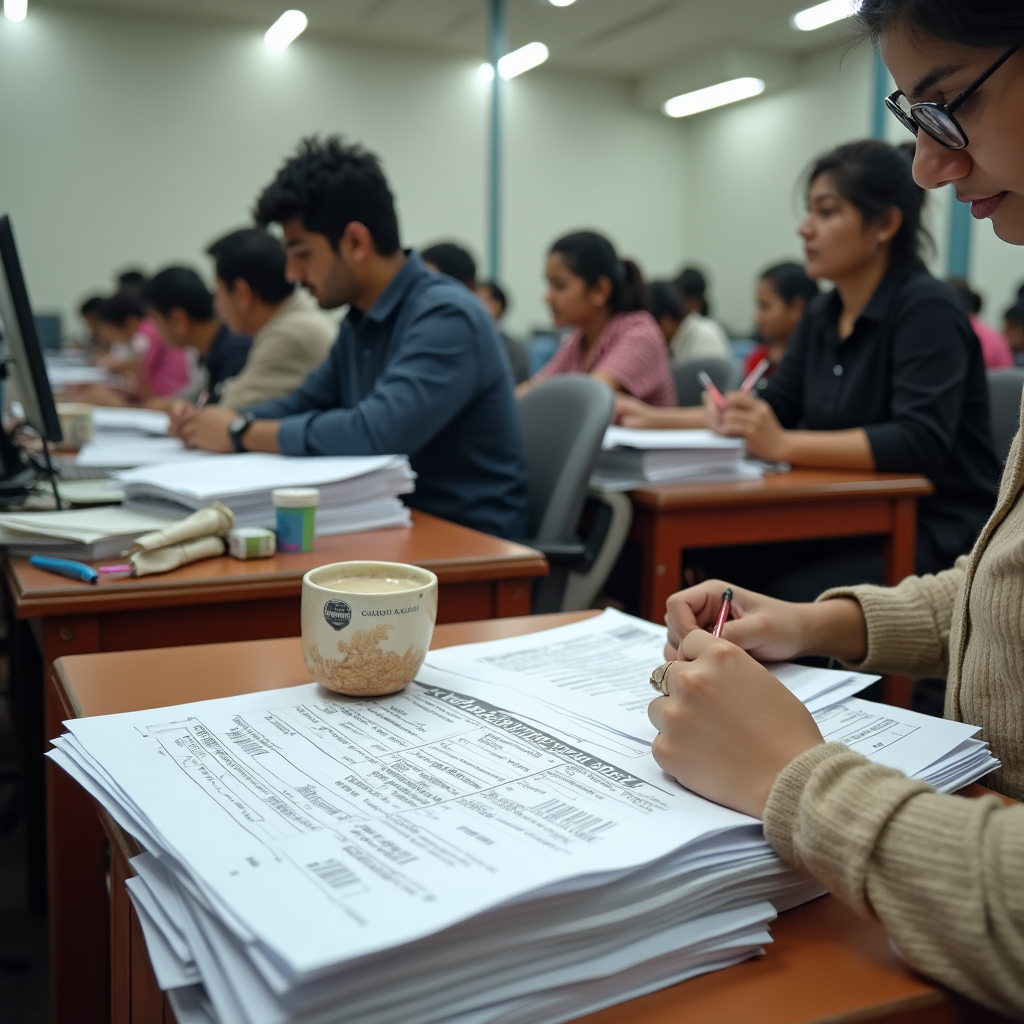This article is written by Nikunj Arora, and further updated by Danish Ur Rahman S. This article provides a detailed overview of Sections 194 and 194A of the Income Tax Act, 1961, along with the applicable Income Tax Rules, 1962. This article also discusses some important terms and the forms that taxpayers have to fill out under these Sections.
Table of Contents
Introduction
Assessees are required to pay income tax on their total income for the previous year, as per the Income Tax Act, 1961. Due to the fact that most returns are generally filed at the end of the financial year, it may be difficult for an assessee like you to pay the full amount by the due date.
Thus, in order to resolve this difficulty, the concept of tax deducted at source (hereinafter referred to as TDS) was introduced in the year 1922, wherein, instead of paying the full tax amount due to the government at a single time in a year, the tax due is paid in part throughout the year, preferably at each month. The main purpose behind introducing TDS is to simplify the collection of income taxes as it eases the burden of the assessees by preventing them to pay huge amount of taxes at a single time. Moreover, it also ensures a continuous flow of revenue to the government.
Tax deduction at source is provided by the Central Board of Direct Taxes (CBDT) on various occasions in order to ease the burden of assessees. A “deduction” means that the tax due on an income is deducted on your behalf by the payer, prior to the income being credited or paid to you.
Section 192 to 206AB of the Income Tax Act provides for the provisions of TDS. A deduction at source is not allowed for all types of income, but only for those that are specifically listed under the Income Tax Act. This article specifically focuses on the provisions of Sections 194 and 194A of the Income Tax Act.
Sections 194 and 194A of the Act play a vital role under the concept of TDS for certain incomes. Section 194 of the Act talks about deducting TDS from the income derived from dividends. Section 194A of the Act talks about deducting TDS from the income derived from specific interests. Before delving into the concept of TDS with respect to dividends and special interests, it is primarily important to know about the basics of TDS which will be discussed further in the article below.
Definition of tax deducted at source
Normally, income tax is paid by a taxpayer on his or her income and most of the time people pay their income tax to the government only after they receive their income from their employer or from their business. However, there exists one of the most important exceptions wherein the income tax is deducted by the government before any income is received by the taxpayer and that exception is the “TDS”.
TDS is the amount deducted by a person as income tax who is responsible for the payment of dividends, salaries, rents, educational fees, interests, etc. before such payment is made to any other person to whom such dividends, salaries, rents, educational fees, interests, etc., is to be paid. The tax which is deducted before the payment of the income is known as “TDS”. The payment of dividends, salaries, rents, educational fees, interests, etc., is an income to the person to whom such payment is being made.
The person who is deducting the tax before the payment of the income is known as the “deductor” and the person whose income is deducted with tax before the payment of such income is known as the “deductee”. The TDS is paid by the deductor to the government.
The tax that is to be deducted at source should be as per the income tax rates for the respective fiscal year as prescribed by the government. It is to be noted that the person deducts the taxes before paying the income. In simpler words, TDS is the amount of income tax deducted before the payment of income.
Moreover, the TDS can be claimed back by the government if the amount of income for that respective fiscal year does not go beyond the amount where it becomes taxable. For example, a person is a salaried employee with a Rs. 40,000 salary per month and his salary is deducted with TDS at the standard rate of 10% every month. The person can claim all the deducted TDS at the end of the year when he files IT returns because his total income for that year is under no tax slab. This concept can be best understood with the help of an illustration.

Suppose a taxpayer with the name A runs a factory and he has to give salary to his employees. B is one of his employees. B has to be paid the sum of Rs. 40,000 as his salary. According to India’s new tax regime, a standard rate of 10% of TDS is to be deducted from a person’s salary irrespective of the amount of income from the salary.
In this case, the TDS for B would be Rs. 4,000 which will be credited to the government by A, and the remaining Rs. 36,000 will be provided to B. If B’s salary amount for the entire amount is under taxable slab then the TDS would get adjusted according to the total tax payable by B. However, if B’s salary amount for the entire year is under no tax slab, then all the TDS deducted for that fiscal year would be credited to B’s account after he files his income return.
Objective of using tax deducted at source
TDS is one of the most influential and innovative practices in the Indian taxation system. It is useful in many ways. TDS has certain very important objectives for which it was introduced by the Department of Revenue under the Ministry of Finance. The following are some of the most important objectives of using TDS in the Indian taxation system:
- TDS reduces tax collector’s burden: One of the most important features of TDS is that it reduces the burden of the tax collectors. Since tax is collected by a person who is responsible for paying income of a taxpayer, TDS reduces the burden of that person since it would be difficult for him to collect the huge amount of taxes in a single time instead of collecting in intervals which is more convenient.
- TDS reduces the taxpayer’s burden: TDS is automatically deducted without any action from the taxpayer. It makes things easier for the taxpayer as he is no longer required to scrutinise his taxation transactions at the end of every fiscal year. Moreover, since TDS is deducted at a flat rate (a rate which is uniform for a set of things, for example, TDS for the income paid to freelancers is deducted with TDS at a flat rate of 10%), it reduces the burden of the taxpayer as he or she is not required to pay huge amounts of income taxes at a single time.
- TDS creates stable revenue for the government: TDS is deducted every month from a person’s income. It creates a stable revenue or income for the government when compared to income tax which is received only once in a year which would make it difficult for the government to do its basic functions due to lack of revenue.
- TDS helps in preventing tax evasion: The most important feature of TDS is that it prevents the taxpayers from the practices of tax evasion which affects the inflow of government’s revenue negatively. TDS helps the government to keep a check on the taxes paid by the taxpayers of the country and thereby preventing tax evasion. Moreover, TDS brings transparency between the government and the taxpayers.
Incomes deducted as TDS under Sections 194 and 194A
Sections 194 and 194A of the Income Tax Act talk about deducting tax at source for certain incomes by the person who is paying that income. For example, if a person A is paying income in any form to B specified under Sections 194 and 194A, then A is required to deduct TDS before paying that income to B. The income that is required to be deducted with TDS under these Sections is explained as follows:
- Section 194 of the Act states that TDS is to be deducted by the principal officer of a company who is paying an income as dividends to a shareholder of the company at a flat rate of 10%.
- Section 194A of the Act states that TDS is to be deducted by the person who is paying income to any person by way of interest other than ‘interest on securities’ at the effective rates in force.
- Section 194A requires any person, other than an individual or a Hindu Undivided Family, to deduct TDS on income paid by way of an interest. However, when an individual or a Hindu Undivided Family’s revenue goes beyond one crore rupees in case of business and fifty lakh rupees in case of profession, the individual and the Hindu Undivided Family is required to deduct TDS on income paid by them by way of interest.
- Certain exceptions are provided under Section 194A wherein other income, by way of interest, from other kinds of interests are exempted from deduction of TDS.

Section 194 of the Income Tax Act, 1961
According to Section 194 of the Income Tax Act, the principal officer of an Indian company (or a company which has made the prescribed arrangements for the declaration and payment of deemed dividend in India) is required (before making any payment of dividend to a resident) to deduct tax at source from the amount of dividend at the prescribed rate.
However, the tax deduction is not required, if on such payment, the payer company is subject to dividend tax under Section 115-O. In other words, if dividend tax is applicable under Section 115-O of the Act, TDS under Section 194 is not required. TDS under Section 194 is required only when dividend tax under Section 115-O is not applicable.
The table given below pinpoints when Section 115-O (or Section 194) is attracted.
| Dividend (other than deemed dividend under Section 2(22)(e) | Deemed dividend under Section 2(22)(e) | |
| Dividend distribution up to March 31, 2018 | Dividend tax under Section 115-O applicable (no TDS under Section 194) | Dividend tax under Section 115-O not applicable (TDS under Section 194 is required) |
| Dividend distribution on or after April 1, 2018 | Dividend tax under Section 115-O applicable (no TDS under Section 194) | Dividend tax under Section 115-O applicable (no TDS under Section 194) |
When a domestic company pays a dividend to a resident shareholder according to Section 2(22)(e), the principal officer is responsible for deducting the tax. On dividends considered under this Section, the TDS rate is 10%. However, there shall be no surcharge, for health and education. It is imperative to note that Section 115-O does not apply to dividends covered by TDS.
For the period between April 1, 2003, and March 31, 2018, tax can only be deducted under Section 194 for deemed dividends under Section 2(22)(e). The tax deduction under Section 194 does not apply to dividends (normal or deemed) as of April 1, 2018.
In simpler words, Section 194 of the Act mandates a company, through its principal officer, to deduct income tax as TDS at the flat rate of 10% from the amount of the dividend given to the shareholders of the company before making payments of the dividends to those shareholders.
Important concepts under Section 194
Principal officer
Section 2(35) defines a company’s “principal officer” as:
- the secretary, treasurer, manager or agent of the company; or
- any person connected with the management of the company upon whom the assessing officer has served a notice of his intention of treating him as the principal officer thereof.
In Income-Tax Officer vs. Joseph and Ors (1971), the Kerala High Court stated that unless the assessor serves him with a notice of the intention to treat him as a principal officer, a managing director cannot be treated as the principal officer of a company, so long as he is not handed a notice of such intention by the assessor.
Indian company
A company incorporated under the Companies Act, 1956 is considered an Indian company under Section 2(26) of the Act. The following are also included:
- The company must be formed under one of the laws applicable to companies formerly in force in any part of India other than the state of Jammu and Kashmir and the Union territories;
- Corporations created by or under federal, state, or provincial legislation;
- A body or institution that has been declared a company under Section 2(17) by the Board;
- Any company formed and registered in Jammu and Kashmir pursuant to the laws of the state;
- Any company incorporated and registered under any law applicable to the Union territories of Dadra and Nagar Haveli, Goa, Daman and Diu, and Pondicherry.
Unless otherwise stated, a company, corporation, institution, association or any other corporate body will only be considered a company if its registered office is located in India.
Arrangement for declaration and payment of dividends in India
According to Rule 27 of the Income Tax Rules, 1962, a company must satisfy three requirements cumulatively in order to be counted as a company with “arrangements for declaration and payment of dividends within India”, as defined in Section 194:
- Share register: At its principal place of business in India, the company should regularly maintain its share register for all shareholders starting on April 1 of any assessment year.
- General meeting: For the purpose of passing the accounts and for declaring dividends relating to the corresponding previous year, the general meeting should be held only within India.
- Dividend payable: Shareholders should be entitled to the dividends, if any, only within the Indian territory.

When should tax be deducted
For a company that has made arrangements to declare and pay dividends within India, or a company that pays dividends within India, the principal officer of the company is required to deduct the tax due on dividends at the rates in effect. In the following circumstances, tax is deductible as early as possible:
- Before any dividend is paid in cash; or
- Before issuing a dividend check or warrant; or
- Before providing any payment or distribution to a shareholder of any dividend, within the meaning of Section 2(22).
In the case of Commissioner of Income Tax vs. Hindustan General Industries Ltd (2000), the Delhi High Court held that under the provisions of Section 194 of the Act, TDS from a dividend is to be deducted, in case of cash, before any payment is provided in cash, and in the case of cheque or by dividend warrants, before such cheque or dividend warrant is sent to the recipient.
Deposit of tax
Taxes are payable to the Central Government in the following manner:
- Regardless of the assessment year or the financial year for which the tax is to be paid, each corporate assessee and all other assesses, who are subject to compulsory audit under Section 44AB, must make electronic payments of tax via internet banking service offered by authorised banks, on or after March 31, 2008. They are also able to pay their taxes electronically by credit or debit card through the internet.
- If tax is deducted on the last day of a given month, tax should be deposited within seven business days of that date. It is possible, however, to deposit tax deducted during the month of March by April 30 following the end of the financial year.
- A challan (ITNS 281) must be used to deposit the TDS.
- The deductor is required to submit Form No. 26B electronically under digital signature prior to filing a claim for refund of TDS paid to the credit of the Central Government under Chapter XVII-B.
Issue of certificate
The person deducting taxes from dividends must issue a TDS certificate through Form No. 16A within 15 days of filing. Even if the tax is paid by the payer of income, the recipient of the income must receive a certificate in Form No. 16A within the stipulated time. The following deductors shall produce TDS certificates in Form No. 16A by downloading them from the TIN website:
- Any deductor (including a government deductor who deposits TDS in the Central Government account through the book entry), if tax is deducted on or after April 1, 2012, and
- Any company (including a banking company), if tax is deducted on or after April 1, 2011.
Taxpayers can download Form No.16A from the TIN website in order to issue TDS certificates.
Amendments in Section 194
The shareholder can enjoy tax exemption on his or her dividends if he or she receives a dividend from a domestic company, up to the assessment year 2020-2021. At that time, domestic companies were required to pay dividend distribution tax (DDT). The Finance Act 2020, however, has abolished DDT for the companies, and consequently, investors are now taxed on dividend income.
The investors are taxed on their dividend income only if the dividend is distributed after April 1, 2020. In this situation, all shareholders are taxed for their dividends, and they will be responsible for paying dividend taxes. There will be no requirement that the companies pay DDT.
Earlier, DDT was applied to dividends paid by an Indian company to its shareholders on or before 31 March, 2020. Dividend distributions by the Indian company were not subject to withholding taxes, regardless of whether the recipients were corporations, pass-throughs, or individuals. Such dividends were additionally taxable at 10% for specified Indian residents (plus surcharges and cess).
Now, DDT is no longer applicable to Indian companies paying dividends; instead, the company should withhold tax at source from the dividend payment on behalf of the recipient since the recipient is now subject to tax. Withholding tax is deducted from dividends paid to resident shareholders at a rate of 10%, and it is deducted from dividends paid to non-resident shareholders at a rate of 20% (plus applicable surcharges and cess).
It is to be noted that there are no further significant amendments with respect to Section 194 after the amendment in 2020-2021. The Finance Act, 2023 does not make any amendments in the aforementioned provision; however, the Finance Act, 2024 adds sub-clause (f) of clause (22) of Section 2 in its purview that is to be applicable from October 1, 2024. This new sub-clause was also added by the same Act, which shall read as: “any payment by a company on purchase of its own shares from a shareholder in accordance with the provisions of Section 68 of the Companies Act, 2013 amends.”

Applicability
Since Section 194 is not the only provision for the purpose of TDS under the Act, it is important to know the applicability of Section 194A. The provisions of Section 194 are attracted only for certain situations and they are discussed in detail below in this article.
The provisions of Section 194 of the Act, 1961 apply to both actual and deemed dividends. Deemed dividends are used by taxpayers to reduce their tax liability wherein the company who is responsible for paying dividends does not pay the dividends, instead to any other financial transaction similar to payment of dividends for the discharge of dividends without paying any taxes.
In the case of Ravindra D. Amin vs. Commissioner of Income Tax (1993), the Gujarat High Court held that a deemed dividend defined under Section 2(22)(e) of the Act would come under the purview of Section 194. The high court also observed that the amount made by a closely-held company to their shareholder in satisfaction of a decree of a court and debited to the account of the shareholder as a loan is a deemed dividend and the same is covered under the purview of Section 194.
As we have just discussed, Section 194 of the Act is not the sole legal provision that deals with the TDS of certain incomes. Section 194 deals only with TDS with respect to dividends. The provision mandates the principal officer of a company to deduct a standard rate of 10% of income tax, from the dividends that are distributed to the shareholders of the company, before making the dividend. Moreover, Section 194 is not applicable to all the shareholders and all the dividends.
In the case of Principal Commissioner of Income Tax vs. India Gelatine & Chemicals Ltd (2015), the Gujarat High Court stated that the payment of dividends to the non-resident shipping company for the shares they hold under Section 172 of the Act is not applicable to the provisions of Section 194 of the Act.
Similarly, in the case of Commissioner of Income Tax (TDS), Mumbai vs. Oberoi Constructions Pvt. Ltd (2016), the Bombay High Court held that when an amount is not taxable, TDS cannot be deducted for the same. In this case, certain amounts were held as not taxable by appellate authorities and court, the Bombay High Court held that TDS for such amounts shall not be deducted.
Section 194 is not applicable for the deductions of TDS from all kinds of dividends. Some kinds of dividends are exempted from the provisions of Section 194. Dividends issued or received under Section 115-O of the Act do not come under the purview of Section 194 of the Act. The issuer of a dividend who is issuing a dividend under Section 115-O is not required to deduct tax at source under Section 115-O.
In the case of Godrej & Boyce Manufacturing Co. Ltd vs. Deputy Commissioner of Income Tax, Mumbai (2017), the Supreme Court of India stated that the dividend income under Section 115-O is an exception to the provisions under Section 194 and thus, when a dividend is issued under 115-O, there is no liability on part of the issuer of dividend to deduct TDS from such dividend.
Nature of tax deducted at source (TDS) deducted from dividends
The TDS is deducted under Section 194 on the basis of any payment of dividends to a shareholder and not on the basis of whether the shareholder is liable to pay tax for that dividend. Section 194 of the Act states that irrespective of whether or not any tax is liable to be paid by the assessee, if he is entitled to any dividend, be it real or deemed, on his shareholding in any company, the company is required to deduct a flat rate of 10% income tax as TDS.
The company has nothing to do with the shareholder’s dividend amount and the TDS deducted from it, nor will it get any credit for the same after it had deducted TDS from its shareholder’s dividend amount and paid to the treasury. However, the assessee would get a credit, for any amount so deducted through TDS, under certain conditions.

Principal officer responsible for deducting tax deducted at source
The liability and responsibility to deduct tax as TDS from the amount of dividends to be payable to the shareholders have been imposed upon the principal officer of the company under Section 194 of the Act. The term principal officer is defined under Section 2(35) of the Act and it includes secretary, treasurer, manager or agent of the company or any other individual connected with the administration and management functions of the company upon whom the Assessing Officer has served a notice of treating him as the principal officer.
In the case of Income Tax Officer vs. Joseph and Ors (1971), the question of whether a managing director of the company should be held as principal officer under Section 194 arose before the Kerala High Court. The high court stated that the terms “the treasury, secretary, manager or agent” do not include the managing director of a company. The manager and managing director are two different entities under the Companies Act, 1956.
The high court finally concluded that unless the assessing officer had served a notice on the managing director of treating him as the principal officer, a managing director of a company cannot be treated as a principal officer under Section 194 of the Act.
Exemption/relaxation from TDS
The following are certain exceptions to Section 194:
Section 197 of the Income Tax Act, 1961
Where the recipient applies to the assessing officer in the prescribed form, Form No. 13 must be filed by the recipient. They can request a certificate from the assessing officer authorising the payer to deduct tax at a low rate or no tax.
As per Section 197 of the Income Tax Act, the tax deduction at source can be equal to zero or at a lower rate of tax. If the TDS is likely to be deducted on certain receipts, the assessee with that TDS will have to make a request to the TDS Assessing Officer who has jurisdiction over his/ her/ its case to receive the benefit.
In Form No 13, the assessee/deductee can apply for a certificate for zero or low TDS deductions on their receipts. The correct filing of the prescribed form and submitting all the required details along with it will help avoid any delays.
For the Assessing Officers, the Commissioner of Income Tax (CIT) has issued certain guidelines to streamline the process of handling applications received under Section 197 and disposing of the same within a stipulated deadline in accordance with the Citizens’ Charter.
As a result of these guidelines, the Assessing Officer is required to make a decision on applications under Section 197 within 30 days after receiving them which are complete in all respects. In general, the intent behind Section 197 is to strike a delicate balance between ensuring the taxpayer has cash available and realising government dues as soon as possible.
Form 15H or 15G
Form 15
Deductees with income that is lower than the taxable limit may use Form 15H or 15G to avoid TDS. Individuals who are claiming certain receipts without deduction of tax can make a declaration under Sub-section (1C) of Section 197A of the Income Tax Act, if they are sixty years of age or more. Here are a few things to remember:
- It is only possible to submit Form 15H by individuals over the age of 60 years;
- There should be no estimated tax for the previous assessment year. Therefore, he paid no tax for the previous year as his income did not reach the taxable limit;
- You will be required to submit form 15H to banks if the interest from one branch is more than Rs. 10,000/- per year.
- All deductors to whom you have extended a loan should receive this form. Suppose you have deposited Rs. 1,00,000 at three branches of the SBI bank. It is your responsibility to submit Form 15H to each branch. It should be submitted before your first notice of interest is received. Though not mandatory, it will prevent the deduction of TDS. In the event of a delay, the bank will deduct the TDS and issue the TDS certificate.
- If you earn interest on loans, advances, debentures, bonds, or any type of interest income other than interest on bank deposits, you must file Form 15H.
Form 15G

Under the provisions of sub-section (1) and (1A) of Section 197A of Act, an individual or person (other than a company or a firm) can declare certain receipts without deducting tax. Here are a few things to remember:
- Form 15G can be submitted by individuals younger than 60 years of age and by Hindu Undivided Families.
- The points and factors that apply to Form 15H will also apply to Form 15G, except that Form 15H is only applicable to senior citizens.
- Fixed deposit interest should be reported on Form 15G prior to receipt of interest.
The proviso of Section 194 of the Act provides exemption from deducting TDS from the dividends given to certain shareholders. Most of the shareholders who are exempted from TDS are insurance companies that have invested in companies and receive dividends in return. The following are the shareholders who are exempt from TDS for the dividends they receive under Section 194.
- The Life Insurance Corporation of India which was established under the Life Insurance Corporation Act, 1956. No dividends shall be subject to TDS for any shares owned by them.
- The General Insurance Corporation of India or any of the four companies formed under the schemes framed under Section 16(1) of the General Business (Nationalisation) Act, 1972. No dividends shall be subject to TDS for any shares owned by them.
- Any other insurer or insurance company. No dividends shall be subject to TDS for any shares they own.
Mode of distribution of dividends
Dividends can be paid by the companies to their shareholders through various methods. Section 123 of the Companies Act, 2013 states that any dividend payable by a company to its shareholders can be made in cash, cheque, or warrant sent through a post to the registered address of the shareholder. However, irrespective of how dividends are paid, the TDS liability under Section 194 of the Act is applicable only when dividends are paid by the approved method.
In the case of Income Tax Officer vs. Joseph and Ors (1971), the Kerala High Court stated that the liability under Section 194 to deduct TDS before paying dividends to the shareholders is applicable only when such payment of dividends by the company to the shareholders happens in an approved manner.
Section 194A of the Income Tax Act, 1961
In Section 194A of the Income Tax Act, provisions are dealt with regarding TDS on interest other than on securities. In the event that interest (other than interest on securities) is paid to a resident, taxes are due under Section 194A.
As a consequence, the provisions of Section 194A do not apply when the payment of interest is made to a non-resident. TDS can also be deducted on payments made to non-residents, however, it is mandatory in such a case to deduct the tax in accordance with Section 195 of the Act.
This Section, therefore, becomes applicable when “interest other than interest on securities” is paid and the deductee is a resident. There are, however, a number of conditions that apply to this application. It is further noteworthy that this Section places responsibility on the deductor, rather than on the deductee.
Any person, (not being an individual or a Hindu undivided family), who is responsible for paying to a resident any income by way of interest other than income chargeable as interest on securities, is required to deduct income-tax thereon at the rates in force at the time of credit of such income to the account of the payee or “interest payable account” or “suspense account” or at the time of payment thereof in cash or by the issue of a cheque or draft or by any other mode, whichever is earlier.
In M/S Solar Automobiles India (P.) Ltd. vs. Deputy Commissioner of Income Tax (2011), the Karnataka High Court stated that tax is to be deducted at sources even where due to losses, no interest is paid by the assessee to its creditors but credit entry of interest is made.
In Commissioner of Income Tax vs. S.K. Sundararamier & Sons (1997), the Madras High Court stated that the deduction of tax is to be made from gross interest and not net interest payable after mutual set off between parties.
Important concepts under Section 194A
Below are some of the most important definitions for the purpose of proper understanding of Section 194A.
Interest
Since Section 194A mandates the person responsible for paying interest as an income to another person except an individual or a Hindu Undivided Family to deduct income tax as TDS at the applicable rate for that respective year, where such payment of interest is done. It is important to know the correct definition of interest for Section 194A.
Section 2(28A) of the Act defines “interest” as an interest payable in any manner in respect of any money borrowed or debt incurred (including a deposit, claim or other similar right or obligation) and includes any service fee or other charge in respect of the money borrowed or debt incurred or in respect of any credit facility which has not been utilised.”

In the case of A and M Agencies vs. Commissioner of Income Tax and Ors (1999), the Madras High Court stated that Section 2(28A) defines interest to refer, not only interest payable on any money borrowed, but it also includes any service fee in respect of such borrowing, the amount of penalty paid by the assessee agent to whom goods have been supplied by the principal.
Damages for any tort cannot be considered as interest under the definition provided under Section 2(28A) of the Act. In the case of G.D.A. vs. Dr. N.K. Gupta (2002), the National Consumer Disputes Redressal Commission held that Section 194A could not be invoked for deducting TDS on the amount, if the amount paid is in the nature of damages for handing over of the possession of the flats or delay in construction, because none of these amount has the nature of interest as defined under Section 2(28A).
In the case of Beacon Projects P. Ltd vs. Commissioner of Income Tax Kerala (2015) and Principal Commissioner of Income Tax vs. M/S. West Bengal Housing (2019), the Kerala High Court and Calcutta High Court respectively stated that the payments made in these cases does not qualify the definition of interest as defined under Section 2(28A) and thus, the appellant did not have the obligation to deduct TDS under Section 194A on the amount paid by him.
In another case, the assessee filed a special leave petition before the Supreme Court by alleging that the amount paid to the investors is not covered under Section 194A and you should not be liable to deduct TDS. The Supreme Court of India held that the payments made to the investors, who invested in the company through debts, is an interest under the definition of Section 2(28A). The court dismissed the special leave petition filed by the appellant and stated that he was liable to deduct tax at source under Section 194A for the payments paid to the investors.
Person responsible for paying
The first words of the Section 194A start with the “person responsible for paying,” wherein the provisions of Section 194A states that the person who is responsible for paying interest as an income should deduct income tax as TDS at the applicable rates for the respective year before paying such interest.
The phrase ‘person responsible for paying’ under Section 194A should be read in conjunction with Section 204 of the Act. The meaning of person responsible for paying is described under clause (iii) of Section 204, and it states that, “the expression “person responsible for paying” means in the case of credit, or, as the case may be, payment] of any other sum chargeable under the provisions of this Act, the payer himself, or, if the payer is a company, the company itself including the principal officer thereof.”
So, basically the person responsible for paying means the person who is responsible to pay the interest amount to the person who is entitled to that interest.
In the case of Shital N. Shah and Others vs. Income Tax Officer (1990), the Madras High Court stated that Section 204 of the Act makes it clear as to who the “person responsible for paying” is under the provisions of Section 194A. The high court stated that under Section 204, if the payer is a corporation, then the corporation itself including the principal officer thereof will be the “person responsible for paying” under Section 194A.
In the cases of In Re Kranti Kumar Saxena vs. Unknown (2002) and State of Madhya Pradesh vs. Parwatibai (2002), the Madhya Pradesh High Court stated that for the purposes of deducting TDS on payment of interest on compensation for compulsory land acquisition, the “person responsible for paying” would be the Land Acquisition Collector or the Land Acquisition Officer, and not the executing court. A Land Acquisition Collector is a government officer who is appointed by the government to govern and regulate the land acquiring process of the government; the powers and functions of a Land Acquisition Collector are discussed under the Land Acquisition Act. The high court stated that the Land Acquisition Collector would be the person responsible for deducting TDS from the payment of interest payable on compensation on compulsory land acquisition.
At the time of credit of such income to the account of the payee

The phrase “at the time of credit of such income to the account of the payee” under Section 194A refers to the time as to when the pay should direct TDS from the interest payable as income to the payee.
In the case of Commissioner of Income Tax, Bangalore and Anr vs. Century Building Industries P. Ltd (2007) and Union Bank of India vs. Additional Commissioner of Income Tax (2019), the Supreme Court stated that the exact meaning of the phrase “at the time of credit of such income to the account of the payee” is that whenever interest is paid to the account of the payee, the payer is liable to deduct TDS from such interest at the tax applicable rates for the respective years.
Payee
It is important for us to know the meaning of “payee” because the deduction of TDS from the income by way of interest is deducted from the income of the payee. The word “payee” under Section 194A is the recipient of the income whose account is maintained by the person, paying the income by way of interest, i.e., the payer or the person responsible for deducting TDS under Section 194A.
In the case of UCO Bank vs. Union of India & Ors (2014) , the fixed deposit was established in the name of the Registrar General. The funds that are in the custody of the court are reflected in the account, and the Registrar General is not the recipient of the amount credited to that account. The Registrar General is not even the recipient of the interest paid to the account.
Therefore, it was held by the Delhi High Court that the Registrar General is not a payee under the purview of Section 194A. Thus, the interest amount which is to be paid to the account of the Registrar General does not attract the provisions of Section 194A and thus the same cannot be deducted with TDS.
Nature of Section 194A
The nature of the Section 194A was clearly stated by the Bombay High Court in the case of Rupesh Rashmikant Shah vs. Union of India and 8 Ors (2019). The Bombay High Court stated that the provision for TDS for the interest paid under Section 194A is not a charging provision. It merely makes TDS on payment of the same, which is an income to the payee.
If the payee has no tax liability for such income, the liability to direct tax by the payer does not arise. The Bombay High Court stated in exact words as “…In other words, provision of deducting tax at source cannot govern the taxability of the amount which is being paid.”
Requirements of Section 194A
The main requirement under Section 194A of the Act is that the payer who is liable to deduct TDS on interest should not be an individual or a Hindu Undivided Family. Additionally, the TDS must be deducted only from the “interest” amount payable to the payee.
In the case of Southern Brick Works Ltd. vs. Commissioner of Income Tax (1984), the Madras High Court stated that in order to attract the obligation to detect TDS under Section 194A, a simple credit of the interest to the account of the creditor is enough.
Adjustment of short deductions
The person responsible for making the payment at the time of making any deduction, increases or reduces the amount to be deducted under Section 194A for the purpose of adjusting any excess or deficiency arising out of any previous deduction or failure to deduct during the financial year.
When Section 194A is not applicable
By virtue of Section 194A(3) and 197(IC), tax is not deductible in the following cases:
- Where the aggregate amount of interest credited or paid (or likely to be credited or paid) during the financial year does not exceed a specified amount;
- Where interest is credited or paid to any banking company, co-operative bank, public financial institution, the Life Insurance Corporation, the Unit Trust of India, an insurance company or a co-operative society carrying on the business of insurance, or notified institutions;
- Where interest is credited or paid by the firm to its partner(s);
- Where interest is credited or paid by a co-operative society (other than a co-operative bank) to its members (i.e. interest on time deposits to its members holding on share or to any other co-operative society);
- Where interest is credited or paid in respect of deposits under the schemes of Post Office (Time Deposits), Post Office (Recurring Deposits), Post Office Monthly Income Account, Kisan Vikas Patra, National Savings Certificates VIII Issue and Indira Vikas Patra;
- Where interest is credited or paid in respect of deposits (other than time deposits made on or after July 1, 1995) with a banking company or interest to non-members on deposits with a co-operative bank;
- Where interest is credited or paid in respect of deposits (by non-members) with a primary agricultural credit society or primary credit society or co-operative land mortgage bank or co-operative land development bank;
- Where interest is credited or paid by the Central Government under different provisions of the direct taxes;
- Where the interest is paid (or, up to May 31, 2015, credited) on compensation awarded by the Motor Accidents Claims Tribunal if the amount of payment or the aggregate amount of such payment does not exceed Rs. 50,000;
- Income paid/payable by an infrastructure capital company/fund or public sector company in relation to zero-coupon bonds;
- Interest paid or payable by an offshore banking unit on deposits (or borrowing) made on or after April 1, 2005, by a person who is resident but not ordinarily resident in India; and
- Interest referred with respect to special purpose vehicles in Section 10(23FC).
How is tax deducted under Section 194A

Section 194A requires the following people to deduct TDS from interest:
- Those other than individuals or Hindu Undivided Families (HUFs). Banks, cooperative societies, post offices, etc., are included in this category;
- This category may also cover individuals or HUFs whose total sales, gross receipts, and turnover from the business or profession carried on by them exceed the monetary limits specified in Section 44AB during the previous financial year (financial year preceding the year in which the income is credited to the deductee).
When tax needs to be deducted at source
TDS must be deducted where the amount of interest paid or credited to the payer/deductor, or that is likely to be paid or credited within a financial year, exceeds INR 40,000 and the payer is:
- An institution of banking or a banking company;
- Co-operative society engaged in the business of banking;
- Post office (under a central government-framed and notified scheme).
Partnership firms are not subject to the provisions of Section 194A relating to the interest they pay or credit to their partners. Therefore, the firm in this case does not have to deduct taxes from interest payments to partners.
The following are a few other instances where tax cannot be deducted:
- Interest paid to any bank or cooperative operating as a bank, including a cooperative land mortgage bank covered by the Banking Regulation Act, 1949;
- All interests are paid to any financial corporation that is established by the federal, state, or provincial governments;
- An interest payment to the Life Insurance Corporation of India under The Life Insurance Corporation Act, 1956;
- Payment of interest to a Unit Trust of India established under The Unit Trust of India Act, 1963;
- The interest which is paid to any company or a co-operative society engaged in the business of insurance;
- Interest payable to any other institutional, association, or body or class of institutions, associations, or bodies notified by the Central Government on or before 31 March 2021;
- The interest paid or credited by a cooperative society to its members (other than a cooperative bank) or to any other cooperative society;
- The rate of interest credited or paid by the Central Government on deposit notifications;
- The interest is credited or paid on deposits held at primary agricultural credit societies, primary credit societies, cooperative land mortgage banks, or cooperative land development banks;
- Under any provision of the Income Tax Act or the Wealth-Tax Act, 1957, the Central Government credits or pays interest;
- A zero-coupon bond whose issue date is on or after the 1st of June 2005 and whose coupon rate is paid or payable by an infrastructure capital company, infrastructure capital fund, infrastructure debt fund, public sector company, or scheduled bank.
- Special purpose vehicle interest is paid to a business trust according to Section 10(23FC) of Income Tax Act.
When is tax be deducted at a lower or NIL rate
Similar to Section 194, under Section 194A, tax can also be deducted at a lower or NIL rate, provided the following conditions are satisfied:
- Declaration under Section 197A using form 15G/15H; and
- Submission of Form 13 application under Section 197.
Declaration under Section 197A using form 15G/15H
The recipient must submit a declaration to the payer under Section 197A along with his/her PAN in order to deduct tax if the following conditions are met:
- Persons other than companies or firms are recipients.
- Tax on total income of the previous year (PY) is NIL.
- The total income for the year is not greater than the exemption limit , which can vary based on age of the individual. For someone below 60 years, the basic exemption limit is of INR 25,00,000 while for senior citizens (aged between 60 to 80 years), the exemption limit is of INR 30,00,000. For people of 80 years or above age (also called super senior citizens), the basic income exemption limit is Rs 50,00,000.
- A similar declaration must be submitted in duplicate on Form 15G. Form 15H shall be for senior citizens. Investors can submit the declaration under the Senior Citizens Savings Scheme, 2004 (SCSS).
- In addition, the nominees of SCSS investors can also present the declaration upon payment after the death of the depositor.
- A bank shall not deduct tax from interest payments upon receiving a declaration (subject to conditions).
Submission of Form 13 application under Section 197

Section 197 allows the recipient to request a certificate to be issued to the Assessing Officer, authorising the deduction of income tax at a lower rate (or a tax-free deduction) if certain conditions are met
- Applications can be filed at any time before taxes are actually deducted. The certificate cannot be issued to a recipient who does not possess a PAN;
- Applicants should receive a certificate with a piece of advice. The certificate will be mailed directly to the person who pays income, on plain paper;
- Retrospective certification is not available;
- Copy of such a certificate may be provided by the recipient to the person paying the income for lower/no deductions at source.
Rate of tax deducted at source
The following tax rates are in effect:
- When the PAN is furnished, interest is credited at 10%; and
- The interest rate if the PAN is not provided is 20% according to Section 206AA of the Income Tax Act. PAN of the deductee should be mentioned in any correspondence and document which is exchanged between the deductor and deductee.
The above rates do not include surcharges, education cess, or secondary and higher education cess (SHEC). So, the basic tax will be deducted at the source. The following table explains about the threshold of certain financial institutions with respect to Section 194A:
| S.no | Institutions that deduct TDS | Rate of TDS | Threshold Amount |
| 1. | Banking institutions (when PAN is shared) | 10% | Rs. 10000 |
| 2. | Banking institutions (when PAN is not shared) | 20% | Rs. 10000 |
| 3. | Financial institutions (with PAN) | 10% | Rs. 5000 |
| 4. | Financial institutions (without PAN) | 20% | Rs. 5000 |
Interest for compulsory compensation
As we have discussed earlier, under Section 194A of the Income Tax Act, a person who is liable to pay interest to another person as income must deduct income tax as TDS from that interest amount at the applicable rate for that respective year. Section 194A provides with all the situations wherein the interest paid as an income should be deducted with TDS, and it also provides all the situations wherein the interest paid as an income should not be deducted with TDS.
If the compensation which is to be paid to the land owner is outstanding, then interest at the applicable rates should also be awarded to the land owner for the outstanding compensation amount.
The main question that arises in this situation is whether the interest at the outstanding compensation comes under the purview of Section 194A of the Income Tax Act. Tuhi Ram vs. Land Acquisition Collector and Anr. (1991) is the first case to answer this question. The Punjab-Haryana High Court stated that interest received from outstanding compensation for the compulsory acquisition of land or agricultural land is an income and is thus, eligible for taxation.
The Punjab High Court held that under the provisions of Section 194A, at the time of payment of such interest to the account of the payee, in this case, the land owner, the authority or the person who is liable to pay the interest is required to deduct TDS at applicable rates for that respective rates under the Section 194A.
In the case of Baldeep Singh vs. Union of India and Anr. (1992), the Punjab-Haryana High Court confirmed that the person responsible for paying the income by way of interest on compensation for land acquisition is the Land Acquisition Collector. Since the Land Acquisition Collector has the compensation money in his possession and is responsible for making such compensation money as income to the land owner. The TDS for any interest on such compensation has to be deducted by him before making such interest to the land owner, whose land is acquired by the government.
The case of Tuhi Ram vs. Land Acquisition Collector (1991) was reaffirmed by the Supreme Court of India in the case of Bikram Singh and Ors vs. Land Acquisition Collector and Ors (1996). However, the Supreme Court observed that Section 194A of the Income Tax Act has no application for the purpose of deducting TDS on the interest payable on compensation for compulsory acquisition of land.
In this case, it was that the Land Acquisition Collector’s action was justified in providing compensation to the land owners without deducting any income tax as TDS. With this view, the Supreme Court of India affirmed the decision of the Punjab High Court, however, the court prevented the application of Section 194A concerning interest on compensation for compulsory land acquisition.
The Supreme Court in the case of Bikram Singh vs. Land Acquisition Collector (1996), held that the provisions of the Section 194A are not attracted in the cases of compensation amount along with interest because the same is not an income, but is a revenue receipt and thus, TDS cannot be deducted under Section 194A.

Similarly, in the case of Raghubhir vs. Union of India (2003), the Delhi High Court held that the interest received on delayed payment of the compensation for compulsory land acquisition was a revenue receipt exigible to tax and Section 194A has no application over such interest amount. In both of these cases, the Delhi High Court relied on the case of Bikram Singh vs. Land Acquisition Collector (1996).
Deduction to be made from gross interest
Section 194A of the Act postulates that the TDS is to be deducted on the gross interest amount at the time of credit or payment of the interest amount and not on the net interest amount. Gross interest is the amount of interest liable to be paid without any exclusions. For example, gross interest may not include the amount which will be excluded from it as a service fee or in the name of interest handling charges. Net interest amount is the actual amount which is credited to the account of the person to whom such interest is to be paid.
In the case of Commissioner of Income Tax vs. S.K. Sundararamier & Sons (1997), the Madras High Court held that the expression ‘interest’ can only refer to gross interest, and it cannot refer to net interest in the context of paying off the income as interest by the person responsible for deducting the tax on such interest under Section 194A.
Only payment of interest covered
Section 194A of the Act is attracted only when income by way of interest is paid to the payee and such interest is deducted with TDS. It is important to note that Section 194A attracts only when the payment is made for interest.
In the case of M/S The LIC Employees Co-operative Bank Ltd. vs. The Assistant Commissioner of Income Tax (2018), the Madras High Court held that the assessee cooperative society carrying on the business of banking with the approval of the Reserve Bank of India could not be held liable to tax on the interest paid to their members under Section 194A, because the interest paid by the cooperative bank to its members is not the interest described under Section 194A.
The payment made by the chit company to its members is not attracted under the purview of Section 194A. In the cases of Commissioner of Income Tax vs. Sahib Chits (Delhi) (Pvt.) Ltd. (2009) and Panchajanya Chits Pvt. Ltd vs Assessee (2016), the Delhi High Court and the Bengaluru Income Tax Appellate Tribunal (ITAT) respectively held that the amounts paid to the subscribers by the company are not interest and thus the chit company is not required to deduct TDS from those interest amounts under Section 194A.
Similarly, in the case of Commissioner of Income Tax vs. Cargill Global Trading Pvt. Ltd. (2011), the Delhi High Court held that the amount paid by the assessee to their customers are mere discount charges and not interest, and thus, they should not be held liable under Section 194A.
Individuals not liable to deduct tax at source
Section 194A of the Act explicitly excludes individuals and Hindu Undivided Families from the liability of deducting TDS for the interest amount paid by them. Thus, if an interest is paid by an individual or Hindu undivided family, then such interest will not come under the purview of Section 194A of the Act.
In the case of M.L. Family Trust and Ors. vs. State of Gujarat and Anr (1993), it was observed by the Gujarat High Court that the beneficiaries were individuals. Since the status of the trustees who are paying interest is that of individuals, the high court held that Section 194A could not be applicable in their case. Thus, they should not be held liable to deduct TDS from the interest paid by them.
In the case of Income Tax Officer vs. Arihant Trust and Others (1994), the Madras High Court held that a trust is normally treated as an individual under Section 161(1) of the Act and, thus, it should also be treated as an individual under Section 194A. The high court held that a trust cannot be given the status of an individual in one provision and have a different status in another provision.

This is because the status fixed for the purpose of assessment in one provision cannot be altered for the purpose of another provision. The Madras High Court held that since individuals are exempted from the liability of directing TDS under Section 194A, the trust and the trustees cannot be brought under the purview of Section 194A.
In the case of Commissioner of Income Tax-XVII vs. Food Corporation of India (2008), the Delhi High Court held that the tribunal was correct in finding that the assessee is not required to deduct TDS for the interest paid by him because the assessee is an individual, and individuals are exempted from the liability of Section 194A.
Penalty
Non-compliance with the provisions of Section 194A of the Act can attract penalties. Both the tax authorities and the courts can impose penalties when the provisions of Section 194A or not followed by the assessee. In the case of The Commissioner of Income Tax (TDS) vs. M/S Muthoot Bankers (2011), the parent company paid interest to its subsidiary company without deducting TDS under Section 194A. The Kerala High Court imposed a penalty upon the parent company for non-compliance with Section 194A of the Act. In the same case, the Kerala High Court held that violation of the provisions of Section 194A attracts the penalty under Section 271C of the Act.
When should TDS be deposited/ Time limit for depositing TDS
It is mandatory that tax deducted from April to February be deposited on or before the 7th of the following month. March taxes must be deposited on or before 30th April.
For example, if the taxes are being deducted on April 25, then you should be depositing them by May 7. On the other hand, if taxes are being deducted on March 15, then you should be depositing them by April 30.
Interest for delay in payment of tax deducted at source
According to Section 201 of the Act, anyone subject to deducting tax at source who fails to do so, or anyone who fails after deducting the tax to pay it to the credit of the government, shall be liable to simple interest at the following rate:
- From the date on which such tax was deductible to the date on which such tax is deducted, interest will be charged at 1% per month or part of a month on the amount of such tax. An interest rate of 1.5% shall be levied on the amount of such tax for each month or a partial month from the date of deducting such tax until the date of paying such tax to the government. As a result, interest will be charged 1% on delayed deductions and 1.5% on delayed payments after deductions.
Section 201 of the Act was amended in the Finance Act, 2022 to provide that if the Assessing Officer has treated the assessee as a defaulter, then the assessee must pay the interest in accordance with that order. It was further amended in Finance Act, 2024, as per which the term “a person resident in India, at any time after the expiry of seven years” is to be substituted with “any person, at any time after the expiry of six years” in sub-section (3) of Section 201. Another such substitution was for the words “under the proviso” with “under the first proviso” under the same sub-section.
Tax deducted at source (TDS) return
The government must be informed by any deductor who deducts tax at the source. Details must be supplied in the prescribed manner to the government. The government must receive these details on a quarterly basis. Each deductor is required to submit quarterly TDS returns in the prescribed form detailing the tax deducted by them. A non-government deductor must file a TDS return quarterly on the dates listed below in the following table:
| Sl.no | Quarterly period | Due date before |
| 1. | January-March | May 31 |
| 2. | April-June | July 31 |
| 3. | July-September | October 31 |
| 4. | October-December | January 31 |
Disallowance of expenses while computing business income due to non-deduction of tax at source U/S 194A

Section 40(a)(ia) provides for a 30% disallowance for any sum payable to a resident that is subject to TDS when computing income chargeable to tax under the head “Profits and gains of business or profession”. There is no payment of the tax deducted during the year if the payment is not made on or before the due date for filing a return of income under Section 139(1).
As a result, the expenditure will be deductible during the year in which that expenditure is incurred if the tax is deducted during the year and paid on or before the due date for filing the return.
It should be noted, however, that any payment disallowed by the foregoing provision will be allowed as a deduction in computing the income for the year in which the tax has been deducted. Even if the assessee does not deduct the tax at source from a payee’s compensation, no disallowance shall be made if the following conditions are fulfilled:
- The recipient has submitted his tax return.
- The income above has been taken into account in such a return.
- A tax return was filed for the income he declared in the return, and he has paid this tax.
- In Form No. 26A, the taxpayer has obtained a certificate, with respect to the deductions, from a Chartered Accountant and provided it to the Income-tax Department electronically.
In Merilyn Shipping & Transports, Visakhapatnam vs. Addl. CIT (2012), the Special Bench stated that the provisions in Section 40(a)(ia) of the Act should apply only to amounts payable at the end of a financial year, and not to amounts that had actually been paid without the deduction of tax at the source during the previous year.
In the case of CIT vs. Vector Shipping Service (P.) Ltd. (2013), the Allahabad High Court affirmed the decision of the Special Bench in Merilyn Shipping that the amount should be payable rather than paid during the year to be disallowed under Section 40(a)(ia) of the Act.
Conclusion
According to the Income Tax Act, a person’s annual income is subject to taxation if it exceeds their total income. Various methods are available for discharging the tax obligation under the Act, such as TDS, tax collected at source (TCS), advance tax, self-assessment tax, and tax on regular assessment. Tax deductibility means that persons making payments of income are required to deduct tax (at specific rates) from such payments and only pay the net amount.
During the applicable period, the deposited tax (called TDS) will be credited to the national treasury. Form 16 or 16A will be issued by the payer to the payee, and the payee will be credited for TDS so that his tax liability is reduced accordingly.
Basically, the provisions are merely a means of collecting income taxes and detecting tax evasion through effective control and information. A TDS certificate is generated through the TIN central system and is downloaded from the TIN website that features an individual TDS certificate number for all deductors (including government deductors).
TDS, as we have just discussed above, is a very important concept because it is one of the well-established and well-functioning taxation practices. It helps both the taxpayer and the government. It prevents the taxpayers from paying huge amounts of tax at a single time which could burden the financial part of their day-to-day life.
It aids the government as it brings a constant flow of tax revenue to the government, which would cease without the help of TDS. Some incomes are deducted with TDS at the rates applicable for the respective year, however, after the assessment year of 2020-2021, most of the incomes are deducted with TDS at the flat rate of 10%.
Frequently Asked Questions (FAQs)
What are the requirements for deducting TDS under Section 194?
Certain requirements should be followed before deducting TDS under Section 194 of the Income Tax Act. First, only companies that are paying dividends to their shareholders alone can deduct TDS from the dividends before paying such dividends. Deduction of TDS under Section 194 is only done for dividends. And finally, only the principal officer of a company paying dividends should deduct TDS.
What happens to the tax so deducted at source?
The taxes so deducted as TDS under Sections 192 to 206AB shall be paid to the government by the respective deductor of such TDS. In our case, the TDS collected on dividends under Section 194, and the TDS collected on specific interests under Section 194A will be paid to the government.
How can individuals prevent TDS deduction on their interest income?
Not all income coming from interests is deducted with TDS by the persons responsible for paying interest. Section 194A requires TDS to be deducted only on certain payments on interest and not on all interests. Taxpayers have various ways under the Income Tax Act to prevent TDS deduction on other interest incomes.
How can taxpayers ensure compliance with Section 194A?
Section 194A is the taxing section and thus, it shall be strictly complied with. Any non-compliance with Section 194A can attract penalties and fines under the Income Tax Act. Taxpayers can ensure compliance with Section 194A by properly auditing their payment of interest and using software that could help deduct TDS automatically before paying such interest.
References
- Direct Taxes Ready Reckoner, by Vinod K. Singhania.
- Commentaries on Income Tax Law, Chaturvedi and Pithisaria’s Income Tax Law, Volume VI and VII.
Students of Lawsikho courses regularly produce writing assignments and work on practical exercises as a part of their coursework and develop themselves in real-life practical skills.
LawSikho has created a telegram group for exchanging legal knowledge, referrals, and various opportunities. You can click on this link and join:
Follow us on Instagram and subscribe to our YouTube channel for more amazing legal content.
 Serato DJ Crack 2025Serato DJ PRO Crack
Serato DJ Crack 2025Serato DJ PRO Crack










 Allow notifications
Allow notifications


